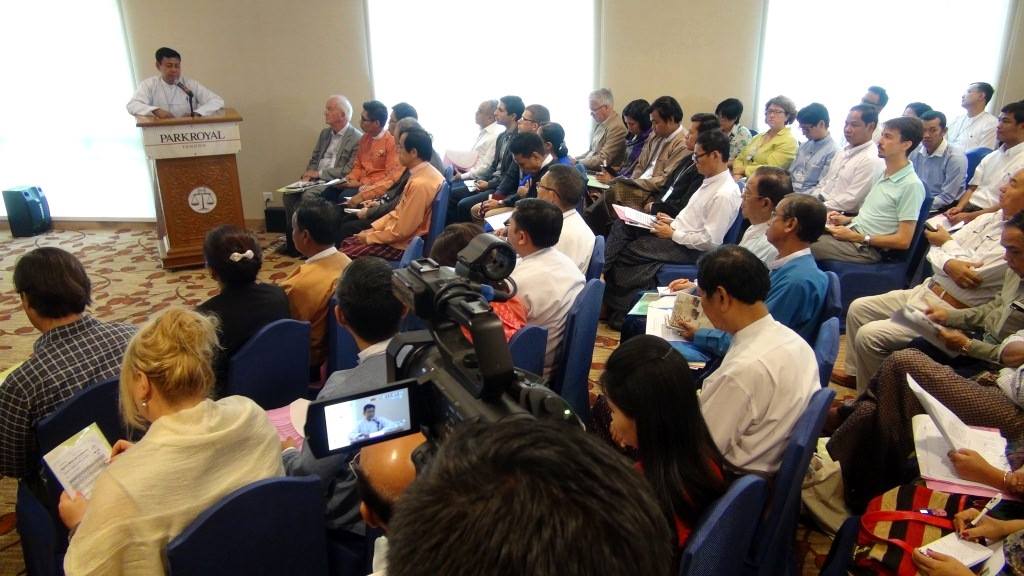Leading members of Burma’s rapidly evolving media industry are urging the government to end its control over state-owned media as the Ministry of Information passes into National League for Democracy (NLD) hands.
The call came as 150 industry heavyweights met in Rangoon over the weekend for the Myanmar Media Law Conference, where they debated the pros and cons of a recently enacted Broadcast Law. The law sees Burma’s Ministry of Information, which once amounted to a council of censors, retain control over Burma’s largest media outlets.
Private media owners took the opportunity to advocate for the transformation of government mouthpieces, such as television station MRTV and print daily The Global New Light of Myanmar (GNLM), into public media institutions rooted in news and current affairs and independent of government review.
The talk shop, organised by DVB and funded by USAID, took place on 19 and 20 March, days before Tuesday’s inclusion of Dr. Pe Myint among president-elect Htin Kyaw’s list of cabinet ministers. The writer is all but confirmed to take over the role of Minister of Information from former military officer Ye Htut, who has held the commission since 2014.
Whether the ministry should continue to exist, let alone control Burma’s widest-reaching media brands, has been hotly contested. The current board, staffed by men favoured by Burma’s former junta, has overseen the country’s graduation from the world’s third-worst place to be a journalist in 2010 to a regionally respectable position of 144th on The Reporters Without Borders 2015 Press Freedom Index. The index ranks 180 countries on media openness. Only four Southeast Asian countries–Brunei Darussalam (121st), Thailand (134th), Indonesia (138th) and Philippines (141st)–currently rank higher than Burma.
The 2013 establishment of scores of print dailies and the return of exile media organisations has been considered a highlight of media reforms enacted under the Thein Sein government. But a spate of recent closures of print journals and difficulty for broadcasters to procure the necessary infrastructure to provide their service within Burma has taken the shine away from reforms.
At the weekend’s Myanmar Media Law Conference, industry members accused the outgoing government of wording the recently enacted Broadcast Law to facilitate the future crowding-out of private media companies from the domestic market. The non-state players say that they will be unable to compete with the deep-pocketed government organisations. Critics say the law’s potential to further diminish the place of private operators would be reminiscent of the attitudes which marked the period before 2013, when Burma’s draconian censorship laws were abolished after six decades.
August’s Broadcast Law provides a legislative framework for the licensing of private broadcasters that have hitherto relied on memorandums of understanding signed with Naypyidaw.
But the ability to establish licensed private entities is not enough, according to the recommendations to lawmakers and stakeholders made by consensus at the end of the weekend’s workshop.
“By recognising and somehow entrenching the idea of government broadcasters, the Law inhibits rather than supports the need to transform these broadcasters [into public service, commercial or community stations],” the Canada-based Center for Law and Democracy stated on Saturday, in an analysis provided to conference attendees.
A Public Service Media Bill, binned by lawmakers in 2015, had been intended to provide the framework for restructuring MRTV, GNLM and other state-owned operations. But the current Minister for Information, Ye Htut, believes government media still plays a crucial role in Burma’s reformed media landscape.
“Before we allowed publishing private dailies, private media groups used to say the Myanma Ahlin and Kyemon won’t last for more than two or three months if they were allowed to compete. But we are still standing now and that’s because we can to an extent fulfil the needs of the audience and market,” Ye Htut told DVB Debate on Sunday.
[related]
“With the government’s TV and radio broadcasts, while we focused on news about government activities, on the other hand we also brought to you programmes no one else would want to air–such as news programmes in 14 different ethnic languages. Would the commercial media be able to provide this?”
Faced with a competitor that has had a decades-long head start, private operators have yet to develop the audiences reached by state-owned media, or the capacity to broadcast to them. The challenge for Pe Myint’s NLD-led Ministry for Information will be to let go of the government’s regulatory powers over the press while allowing private outlets to catch up.



